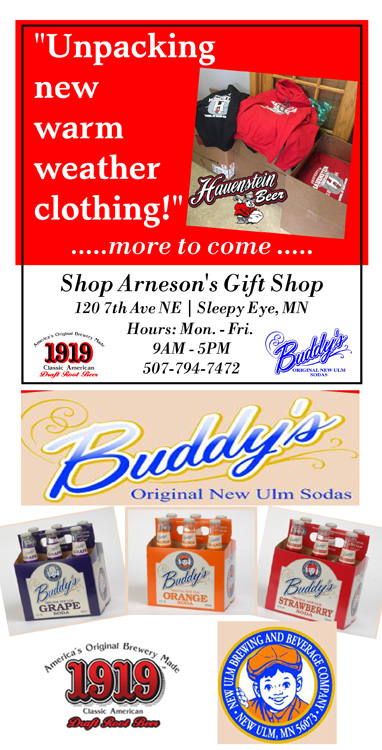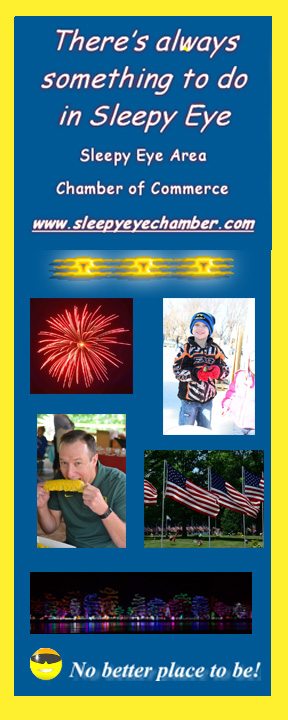There are signs of summer around: bugs we like (fireflies), bugs we don’t like (mosquitoes), corn tassels soon to shoot out. And kids on bikes. In town, even though there are less children than there used to be, kids on bikes are still a common sight. That means, of course, summer vacation!
Summer vacation is the Great Liberation. After nine months of a type of captivity, kids are free. “No more school, no more books, no more teacher’s dirty looks.” I’m writing here mostly about children in those years between when they need older eyes on them, and when jobs and other responsibilities begin to appear. About ages nine to fourteen. Those are the ones I see buzzing about town on their bikes.
Besides on bikes, you see kids on the fishing shore where the trail runs along Sleepy Eye Lake. You see others shooting basketballs at hoops in front of garages. You can hear kids screaming at the water park from blocks away. (What you seldom see is kids playing catch or pick-up baseball. That is a sadness among my baseball friends, but a topic for another day.)
Teachers talk about summer slack when children lose some skills and knowledge that those teachers worked hard to instill. Good parenting tries to minimize that with some time in books and maybe even a worksheet or two. Part of hanging around with a kid should involve an occasional mental nudge. “So, what kind of tree is that?” “How would we figure the area of our deck?”
Summer vacation is by no means wasted time. We understand kids need spaces of time to fill on their own. Here is where imagination and creativity can take root. Play is critical to physical and mental growth as body and mind stretch. Some play should come from a child’s free-wheeling brain. This is not to say children should be ignored. But if given a safe and nurturing environment, some alone-time and empty-time is valuable.
Safe, mostly. I remember being amazed how summer took its toll on our kids at a certain age. By this time of July, their arms and legs were adorned with bug bites, bruises, and cuts. All this, on top of some sunburn. Summer vacation is not for the timid.
A benefit of the Great Liberation of summer is the chance for brothers and sisters to be brothers and sisters rather than herded to separate classrooms. Science writer Jeffrey Kluger in his book, The Sibling Effect, talked about these relationships. “Nobody affects us as deeply as our brothers and sisters, not parents, not children, not friends. From the time we and they are born, our siblings are our collaborators and co-conspirators. They teach us how to resolve conflicts and how not to, how to conduct friendships and when to walk away. Our siblings are the only people we know who truly qualify as partners for life.”
I had brother Dean who was close to my age. Dean was blind and spent weekdays at Faribault at what was then called the Braille and Sight Saving School. Most weekends he was home, but summer vacation was our big chance to play, fight, work together, create, imagine, build stuff, fight some more, explore, laugh, and sometimes hit each other.
Dean being blind meant we had to find our own ways to play baseball and football. We never could come up with a version of basketball that worked for a blind and sighted kid. That wasn’t a loss as long as we could be Twins and Vikings. We also came up with things like a kitchen table baseball game with a marble as the ball and toy farm animals to man positions. The animals had names and unique personalities, and we would conduct pre and post-game interviews.
We seemed to break a lot of stuff, like windows. Perhaps that was the result of Dean’s lack of vision and my lack of coordination. Thankfully my parents were forgiving. It calls to mind the story Harmon Killebrew told in his Hall of Fame speech. In talking about growing up, Harmon said, “I’ll never forget, we used to play a lot of ball out in the front yard, and my mother would say, ‘You’re tearing up the grass and digging holes in the front yard.’ And my father would say, ‘We’re not raising grass here, we’re raising boys.’”
My other siblings were older, and that meant a steady stream of visiting nieces and nephews to the farm who became playmates and chores-helpers. My oldest nephew Scott spent a chunk of five summers escaping Burnsville for his grandparent’s farm on the prairie.
Scott became an auxiliary brother, and the family referred to Scott, Dean, and me as the Three Musketeers. I am sad to report that Scott passed away of a medical condition earlier this summer. He was sixty. Rest in peace Scott. Your spirit will always be a memory on the farm.
I remember being a little jealous of my town friends because they could get together and play ball or play on the Indian trails back behind St. Mary’s School. The trade-off for a farm kid was a grove to explore, line fences to follow, rock piles to climb, and cows and a farm dog to get to know.
It may not be completely accurate, but in my memory, I didn’t wear shoes during the summer, excepting for church. I know there was a couple one doctor’s visit for tetanus shots after stepping on nails. The bottoms of my feet calloused over, and the occasional step on a thistle or into manure wasn’t an issue. As parents on the same farm, we did promote shoe wearing to our children. Bare footedness was one of those generational divides.
Even though it has been many years, but I can recall the immense and unadulterated joy that came with the last day of school. It’s funny, but the school calendar was ingrained in me long after college. For seventeen years, life fell into nine and three-month patterns that were hard to shake from my conscience. Years after, I felt an unexplained buoyancy in early June when the sun was out past nine and sense of foreboding in late August as the days grew shorter.
For many of us, summer vacations were our last large swaths of unstructured time. I have a few friends dipping their toes into retirement, some enjoying unstructured time for the first time in half a century. It turns out it’s quite a thing to say, “I’m going to do what I want today.” Of course, there’s a little less energy than that of a twelve-year-old.
So, when you see a kid biking wildly down the street this summer, be a little careful with the car. Know that they’re doing the important work of summer vacationing. Maybe give them a thumb’s up as they go past.








